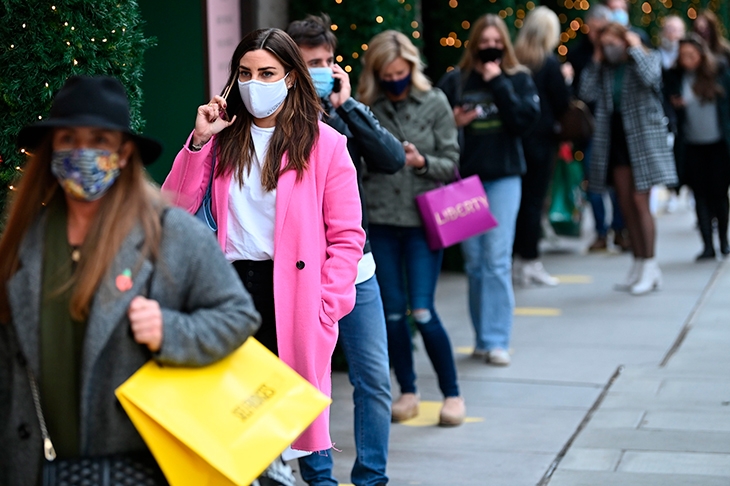Compared with the United States, the UK has so far been relatively cautious about launching stimulus programmes to kick-start the economy. And yet perhaps it doesn’t need to. People are paying off their credit cards, putting some money into the stock market, buying new houses, as well as finally booking a restaurant and getting back to the shops. A lot of money is about to be unleashed on the economy, even if this stimulus is largely invisible now. The interesting question is this: where will all the money go, and which sectors will be the big winners?
It may at times seem as if Rishi Sunak is spending like crazy. By global standards, however, he is far from exceptional. In the US, President Joe Biden’s relaunch of the American economy will take the total stimulus to more than 25 per cent of GDP, while ours is a more modest 15 per cent.
Britain has spent plenty, of course, with the furlough scheme, soft loans for business and a vast increase in health spending. Nonetheless, extra demand does not just come from the state. It can also come from individuals. A total of £150 billion in ‘excess savings’ has been built up over the past year according to research from Pantheon Macroeconomics. That is the equivalent of 7 per cent of GDP.

We all know where it has come from. We have been locked down for much of the past 12 months. Our incomes, whether from working from home for our employer or from furlough payments, have not been very much affected (except for the shamefully excluded self-employed, that is). But we haven’t been able to go to the pub or eat out in a restaurant or spend a weekend in Prague or, come to think of it, do anything very much apart from take a walk and bake some sourdough bread. The result? Unusually for the British, who have been collectively hammering their credit cards for 30 years, we suddenly have lots of cash in the bank. And as lockdown gradually eases, we will start spending that again.
What will we do with all the extra money? There are already some clues in the figures. There has been a big jump in one-off mortgage repayments, so a lot of it is clearly going into paying off our debts (about time, some of us might argue, since British consumer borrowing has looked dangerously high for many years). One result of that will be a huge surge of cash flowing into the banks and building societies, and that in turn will lead to a massive rise in fresh lending as they shovel all that money out again in the form of new loans. That will be great for house prices, already starting to rise strongly, and also for the home improvements industry. Like every British boom, this one will be led by rising property prices.
The British have never needed much encouragement to go on a wild spending spree
Next, we can expect to see a big surge in investment. In the US a lot of stimulus money has gone straight into the stock market. We should expect to witness something very similar in this country. The online brokerages have already reported huge rises in the numbers of new accounts being opened, and the FTSE 100 is rising strongly as money pours into the market. Both Hargreaves Lansdown and Interactive Investor reported a record year for funnelling money into tax-efficient ISAs as the old tax year expired. The private retail investor — largely forgotten about in the City over the past two decades — looks set to make a return.
And naturally, a big chunk of all that extra money will simply be spent as we get back to enjoying ourselves again. The restaurants and bars will boom. Beauty salons will be doing a roaring trade as unkempt hair and neglected nails get some lavish attention. The gyms will be signing up new members as everyone tries to lose some of that extra lockdown weight, while the theme parks, cinema and clubs will be packed again. Heck, who knows, maybe the new James Bond movie will finally be released. Even retailing, after a decade of relentless decline, may have a last hurrah as we remind ourselves what shops are before they resume their long farewell.
True, not every sector will flourish. The airlines and travel industry may still have a few tough months ahead of them as restrictions, tests, quarantines and confusing red, green and orange lists remain in place. The supermarkets may have a difficult time as we go back to eating meals out, and grabbing a sandwich at our desks, instead of feeding ourselves exclusively at home. And perhaps most significantly, the companies that have doubled-down on online will have to retrench. The slice of retailing accounted for by online sales hit an all-time high of 36 per cent in January, the highest on record, and more than double the level of a year ago. It will drop back from that as we start shopping in person again.
Even so, there is no question the UK is going to see a spending boom as lockdown eases. There is a huge amount of pent-up demand. We all have cash burning a hole in our pockets, or at least stacking up temptingly on an app on our phones. The British have never needed much encouragement to go on a wild spending spree and it is unlikely the pandemic has changed that.
In reality, the economy is likely to witness a consumer bonanza. A stimulus on a Biden scale is on the way, except that it will be coming from the private sector rather than the public. We can already start to see signs of the winners that will emerge from that — but it still has a lot further to run as the summer unfolds.






Comments